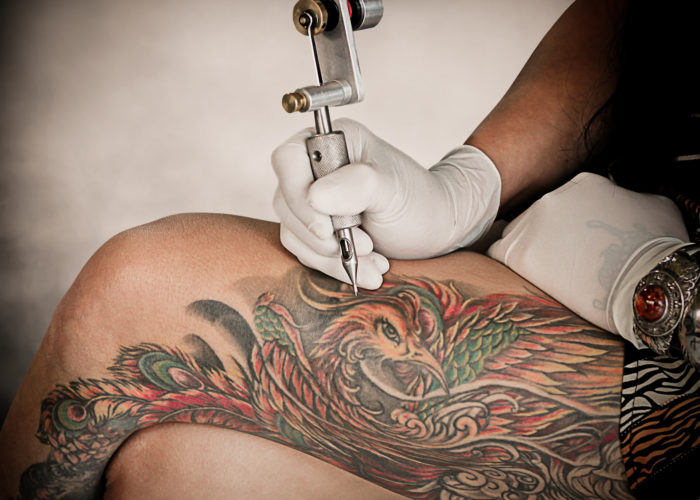
Think before you ink – tattoos can take a toll on your body
September 5th, 2019There is a significant public health concern about toxic metals found in the human body through having a tattoo. Nanoparticles from pigments and impurities found in tattoo ink travel around the body on a potential course of destruction. Research has revealed that tattoo ink can be responsible for a chronic enlargement of the lymph nodes and a breakdown in the immune system.
Human beings need healthy lymph nodes which are small glands to fight infection and filter out viruses and bacteria that can cause many different illnesses. Doctors are warning those with weak immune systems not to have tattoos. The caution comes after a woman with cystic fibrosis and lung transplants developed knee pain after having a tattoo on her leg which caused major complications. (1)
Infection from unsterilized tattoo needles and the transmission of diseases were always the focus of concern when it came to having a tattoo but now the potentially high levels of toxic elements found in the ink have hit the headlines.
Tattoos and heavy metal…
Most people have a story behind their tattoos, simple or intricate designs that can be decorative, symbolic or pictorial. With 24% of the population ‘inked’, it’s clear to see that this form of body modification is very popular. However, the process of having a tattoo involves breaking the skin barrier with a needle and injecting coloured ink into the dermis. Researchers believe that when skin is tattooed the immune system goes into overdrive trying to kill the foreign substance, much like it does with a virus or bacteria. Over the years the tattoo’s will begin to fade, one of the main reasons being your immune system is constantly attacking the ink.
The study also revealed that the preservatives and contaminants in the ink travel to the lymph nodes and they become tinted with the colours in the tattoo. (2) The ink pigment is a ‘foreign body’ and the immune system responds and attempts to clear it, the tattooed skin swells and tiny particles of the ink are carried away in the bloodstream via the white blood cells. Some of the particles can be too big to be removed and they stay in the body. (3)
The heavy metals found in tattoo ink such as mercury, lead, common rust, iron oxide, cobalt and nickel stay in your body when you have a tattoo. In addition to that, research by the ESFR (European Synchrotron Radiation Family) has revealed that nickel and chromium come away from the tattoo needle through wear and tear and those metals travel around the body too. When a tattoo ink contains titanium dioxide (a white pigment often mixed with bright colours such as green, blue and red), it abrades the needle. The researchers claim that the metals inside the pigment could explain why some people suffer from allergic reactions to tattoos. (4) After a tattoo is done, scar tissue may form which can develop in small lumps known as granulomas and if a person with a tattoo has an MRI scan the tattoo can swell or burn which can interfere with the quality of the scanned image.
In July 2018 Health24.com reported about a woman who had a tattoo of a heart put on her ankle, six weeks later the tattoo became bumpy and the red ink colour was fading. The use of antiseptic cream didn’t help so she went to see a dermatologist who had to surgical remove the tattoo due to the lady’s allergic reaction to the metallic content in the red ink. (5)
There is ongoing research into tattoo ink being done by the FDA (Food and Drink Administration) in the U.S. They said that there are still a lot of questions about the long-term effects of the pigments and other ingredients including contaminants in the ink. The FDA has received reports of bad reactions to tattoo ink right after and even years later the tattoo has been done, suggesting a person may become allergic to other products such as hair dyes if a tattoo contains p-phenylenediamine (PPD). (6)
Having a tattoo can come with complications and health risks, some reactions can be severe:
- Infiltration of the lymph nodes obstructing its ability to fight infection
- Behavioural dysfunction
- Damage to the central and peripheral nervous system
- Kidney and liver function issues
- Sepsis (blood poisoning)
- Allergic reactions
- Skin conditions such as eczema
- Birth defects
- Swelling
Treatments for such issues can sometimes be extensive with the use of antibiotics, hospitalization, surgery or worse case – fatality.
Whilst tattoos are supposed to be permanent, there is an option for laser treatment to remove the tattoo or as much of it as they can. The removal lasers are exceptionally hot and rapid. The ink is heated so it can expand, and the zap of the laser must be quick and precise to leave half of the particle cool. The opposing forces of hot and cool case the ink particles to break apart. Once the ink particles are small enough, they can be absorbed by the white blood cells and transported to the liver. The process comes with discomfort and limitations and it can be pricey. Sometimes the tattoo can’t be entirely removed but some pigments can stay in the skin where there is a risk of scarring.
Having tattoos can become an addiction with some people choosing to cover their whole body with ink. In the USA tattoo inks are subject to regulation by the U.S. Food and Drug Administration as are cosmetics and colour additives, however, it’s not generally exercised. There is no process across Europe for assessing the safety of tattoo inks although some countries in the EU have their legislation. It is highly advised to seek out professional and trained tattoo artists who have bloodborne pathogen training.
Supposedly, tests aren’t carried out on animals to see what the effects of tattoo ink and the metallic content are long-term. It is early days for research into this topic but you have to ask yourself what is going on inside the body of a person covered in tattoos or their tattoos are fading and spreading. The human body is designed to fight off foreign bodies and toxic elements but there has to be a limit to what it can withstand. By taking certain supplements you can enable your body to excrete some toxic metals.
DMSA-Pro contains DMSA which is a known potent chelator of mercury and lead. Regular use can help to lower your body burdens of mercury by enabling you to excrete safely and naturally the toxic metals that enter our bodies by some of the most unexpected sources like tattoos. Alternatively, EDTA Pro is a potent chelating agent that supports the removal of heavy metals and harmful mineral deposits from the body’s tissues and organs. EDTA Pro also includes malic acid commonly found in fruit which plays a vital role in energy production through the metabolic cycle, as well as garlic, a natural antioxidant and immunity booster.
A tattoo can be a beautiful picture, a picture is worth a thousand words, but your health is worth a lot more.
If you have tattoos or know of any friends with tattoos, please share this information, and if you are interested in purchasing EDTA Pro and DMSA Pro for the chelation of heavy metals from your body – whether you have tattoos or not, www.theantiaging.store have a 10% discount code : 10OFF on both products.
EDTAPRO information Available: http://bit.ly/EDTAProInfo
DHEAPRO information Available: http://bit.ly/DMSAPROInfo
References:
- https://www.theguardian.com/fashion/2018/jun/18/tattoo-health-warning-for-people-with-weakened-immune-systems
- https://www.sciencealert.com/scientists-have-found-new-proof-that-your-tattoos-travel-around-your-body/page-2
- https://www.bio-rad-antibodies.com/blog/how-macrophages-make-tattoos-last.html
- https://www.esrf.eu/home/news/general/content-news/general/metal-particles-abraded-from-tattooing-needles-travel-inside-the-body.htm
- https://www.health24.com/Medical/Skin/About-skin/5-dangerous-health-risks-of-tattoos-20180504
- https://www.fda.gov/consumers/consumer-updates/think-you-ink-are-tattoos-safe
- http://thescienceexplorer.com/brain-and-body/science-behind-laser-tattoo-removal
Further reading:
1.) https://www.livescience.com/50996-tattoos-have-long-term-risks.html
3.) https://www.nationalgeographic.com/news/2018/03/ancient-egyptian-mummy-tattoos-spd/
4.) https://www.bbc.co.uk/news/uk-england-london-35400010
5.) https://www.bbc.co.uk/news/stories-42568390
7.) https://www.theguardian.com/world/2018/aug/07/eu-proposals-limit-chemicals-tattoo-inks-cancer-fears








